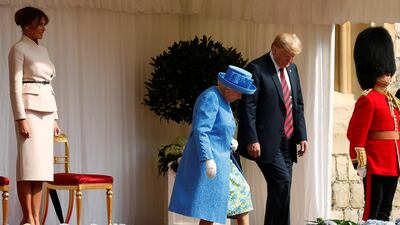Ahead of US President Donald Trump’s three-day state visit to the UK scheduled from Monday, John Bolton, his national security adviser, doubled down on Iran, saying the threat from Tehran was not over and that the country “will be held accountable”.
In turn, Alistair Burt, the UK’s former minister for the region, warned that America’s “hit them in the nuts first” diplomacy was putting the Middle East on a dangerous trajectory towards a regional war, at a time when British interests were in putting out rather than starting fires in the region.
Amidst a backdrop of soaring tensions with Iran and ongoing disagreements between the two allies, Mr Trump is expected to gleefully ride in the Queen’s golden carriage down the Mall on June 3 – as he specifically requested – and then enjoy a party in his honour at Buckingham Palace.
Middle East politics will be high up on the agenda as US and UK officials wine and dine, analysts say. The top priority for the Trump administration in this department will be to persuade the UK to put additional pressure on Iran, Jonathan Schanzer, senior vice president for research at the Foundation for Defence of Democracies in Washington, told The National.
“Without question the US sees Iran as its top threat in the Middle East and will be looking for help from its important transatlantic ally,” the analyst, whose arguments on the Iran nuclear deal and other policy matters in the Middle East have often been in line with those of Mr Trump, said.
While differences remain between the US and its allies over the Iran nuclear deal, Mr Schanzer argued that the overall assessment of Iran’s threat in the West “is more aligned now than it has been”. He said the president’s visit would offer the opportunity for policies to be "calibrated".
In May, the top British general in the US-led coalition against ISIS opened a rift between the United States and its closest ally after saying there was no increased threat from Iranian-backed forces in Iraq or Syria – a blatant contradiction of US assertions used to justify a military build-up in the region.
The statement by Maj Gen Christopher Ghika, who is a deputy commander of Operation Inherent Resolve – the coalition conducting counter-terrorist operations against ISIS in Iraq and Syria – drew a rebuke from the US State Department.
Britain's Ministry of Defence patched things up by issuing a statement that downplayed Maj Gen Ghika’s comment but avoided endorsing the American assessment of the threat level.
Unlike Mr Schanzer, who sees the statement as a sign of rapprochement, observers on the other side of the Atlantic see it as a reflection of the UK’s diplomatic dilemma: how to avoid jeopardising its single most important security relationship over growing differences on foreign policy.
Richard Whitman, associate fellow at Chatham House, told The National that "the default position of the UK is to avoid any instance in which it looks and feels like there is going to be a divide across the Atlantic and to try and mitigate that".
Now, as disagreements between the two countries span from trade relations to foreign diplomacy, this is becoming increasingly difficult.
During Mr Trump's visit, the UK will therefore seek to avoid getting bogged down in the specifics of foreign policy matters and dodge any decision-making, Mr Whitman said, while playing up the idea that there is a broader special understanding between the two.
Indeed, the “special relationship”, as Winston Churchill called it after the Second World War, runs deeper than that between president and prime minister.
The UK retains a global military footprint which – although small in comparison to the US – remains of real value, and it has proven a reliable partner on intelligence-sharing and defence.
As the UK prepares to leave the European Union, it will also likely seek to further strengthen its rock-solid relationship with the US on defence-related matters. Discussions are also expected to focus on areas where agreement will be easier to find, including the fight against ISIS and how to deal with the continued presidency of Bashar Al Assad in Syria.
But with British Prime Minister Theresa May set to leave office a few days later, Mr Trump’s visit is likely to be void of decision-making and focused more on proving to the world that the transatlantic alliance is alive and well.
Indeed, a state visit is among the heaviest weapons in Britain’s diplomatic arsenal and was granted only to George W Bush and Barack Obama before Mr Trump.
Mr Whitman called this “the diplomacy of flattery”, an attempt to “offer something special just as a way of handling Trump and addressing his capriciousness”.
If Mr Trump does not once again do something like calling London Mayor Sadiq Khan “pathetic”, or otherwise inflame the ire of the 250,000 protesters expected to meet him in London, this strategy may work just fine.

